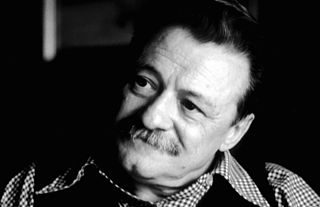A Quote by Mario Benedetti
I do not write for the reader to come, but for him who is here, short of reading the text on my shoulder.
Related Quotes
We must be forewarned that only rarely does a text easily lend itself to the reader's curiosity... the reading of a text is a transaction between the reader and the text, which mediates the encounter between the reader and writer. It is a composition between the reader and the writer in which the reader "rewrites" the text making a determined effort not to betray the author's spirit.
So we start with an oversignifying reader. Those texts that appear to reward this reader for this additional investment - text that we find exceptionally suggestive, apposite, or musical - are usually adjudged to be 'poetic'. ... The work of the poet is to contribute a text that will firstly invite such a reading; and secondly reward such a reading.
The power of a text when it is read is different from the power it has when it is copied out. Only the copied text thus commands the soul of him who is occupied with it, whereas the mere reader never discovers the new aspects of his inner self that are opened by the text, that road cut through the interior jungle forever closing behind it: because the reader follows the movement of his mind in the free flight of day-dreaming, whereas the copier submits it to command.
And so, when I began to read the proffered pages, I at one moment lost the train of thought in the text and drowned it in my own feelings. In these seconds of absence and self-oblivion, centuries passed with every read but uncomprehended and unabsorbed line, and when, after a few moments, I came to and re-established contact with the text, I knew that the reader who returns from the open seas of his feelings is no longer the same reader who embarked on that sea only a short while ago.
Our amended Constitution is the lodestar for our aspirations. Like every text worth reading, it is not crystalline. The phrasing is broad and the limitations of its provisions are not clearly marked. Its majestic generalities and ennobling pronouncements are both luminous and obscure. This ambiguity of course calls forth interpretation, the interaction of reader and text. The encounter with the Constitutional text has been, in many senses, my life's work.
The reader must come armed , in a serious state of intellectual readiness. This is not easy because he comes to the text alone. In reading, one's responses are isolated, one'sintellect thrown back on its own resourses. To be confronted by the cold abstractions of printed sentences is to look upon language bare, without the assistance of either beauty or community. Thus, reading is by its nature a serious business. It is also, of course, an essentially rational activity.
Loving your subject, you will write about it with the spontaneity and enthusiasm that will transmit itself to your reader. Loving your reader, you will respect him and want to please him. You will not write down to him. You will take infinite pains with your work. You will write well. And if you write well, you will get published.
The process of reading is not a half sleep, but in the highest sense, an exercise, a gymnast's struggle: that the reader is to do something for him or herself, must be on the alert, just construct indeed the poem, argument, history, metaphysical essay--the text furnishing the hints, the clue, the start, the framework.
Like when you pick up a book and you don't realize what type of text it is - it could be an essay, a novel, a biography - and at one point you realize you don't know where, as a reader, you want to be. Where are you going with this text? What is the goal? How are you supposed to interpret what you're reading? And people's responses vary - some dislike it, and are put off by the confusion, the lack of comprehension.
The main thing I try to do is write as clearly as I can. Because I have the greatest respect for the reader, and if he's going to the trouble of reading what I've written -- I'm a slow reader myself and I guess most people are -- why, the least I can do is make it as easy as possible for him to find out what I'm trying to say, trying to get at. I rewrite a good deal to make it clear.
Reading, therefore, is a co-production between writer and reader. The simplicity of this tool is astounding. So little, yet out of it whole worlds, eras, characters, continents, people never encountered before, people you wouldn’t care to sit next to in a train, people that don’t exist, places you’ve never visited, enigmatic fates, all come to life in the mind, painted into existence by the reader’s creative powers. In this way the creativity of the writer calls up the creativity of the reader. Reading is never passive.







































